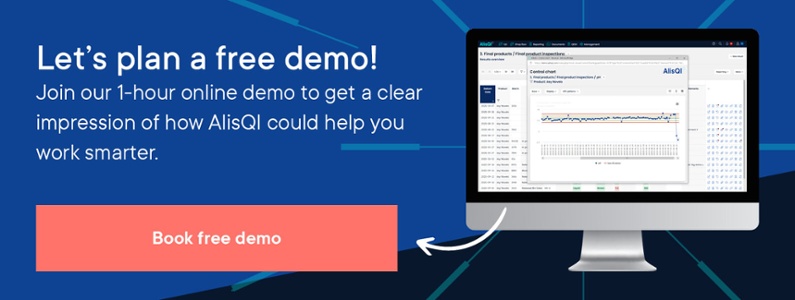Solvers help you monitor quality, apply SPC, manage equipment, and ensure traceability.

Achieving higher sustainability levels with your QMS
A Quality Management System (QMS) is used as a framework to manage and maintain the quality of products and services in various sectors. A good QMS applies the principle of continuous improvement, aiming to increase customer satisfaction, streamline operations, and improve the bottom line of businesses.
However, the role of a QMS extends beyond quality control. QMS plays a big part in driving sustainable practices by helping to manage resources effectively, control waste, and encourage efficient processes.
In this article, we’ll take an in-depth look at the two main sustainability areas – waste reduction and resource management – and how a QMS can contribute to both.
QMS and sustainability goals
Through waste reduction and resource optimization, your QMS plays a pivotal role in achieving the broader sustainability goals of the organization.
Lowering carbon footprint with QMS
QMS helps to create leaner and more efficient processes, which directly contribute to a company's sustainability goal of reducing its carbon footprint:
- Energy efficiency: Identifying areas of waste and inefficiencies helps to promote the use of energy-saving practices. Reduced energy consumption leads to a lower carbon footprint.
- Process optimization: Through the continuous improvement ethos of QMS, businesses can optimize their processes to be more environmentally friendly, reducing their overall greenhouse gas emissions.
Recycling: a sustainable practice enhanced by QMS
Recycling is a fundamental aspect of sustainability goals. QMS contributes to this effort by:- Promoting a culture of recycling: A good QMS encourages a company-wide commitment to recycling and waste reduction.
- Optimizing resource use: Implementing effective resource management strategies minimizes the need for new resources, leading to increased recycling and reuse.
- Sustainable supplier management: QMS can incorporate sustainability criteria into supplier evaluations, encouraging suppliers to adopt recycling and other sustainable practices.
A no-code QMS to increase efficiency
No-code Quality Management Systems (QMS), such as AlisQI, are revolutionizing the way businesses manage their quality control and operational processes. They enable companies to adapt their QMS without the need for coding knowledge. This enhances efficiency, flexibility, and accessibility. It also makes a significant contribution to helping companies achieve their sustainability goals.
Streamlined processes and resource optimization
With a no-code QMS you can implement and adjust quality processes much more easily. It allows anyone in your organization to tweak and customize workflows as needed, which increases efficiency across the board. This saves time and money, as well as contributing to sustainability objectives.
- Reduced paper usage: Traditional QMS often involves considerable paperwork. In contrast, a no-code QMS digitizes these processes, significantly reducing the need for physical documentation and, hence, lowering your company's carbon footprint.
- Energy efficiency: Digitized processes generally consume less energy than their physical counterparts.
Data-driven decision making for sustainability
A QMS allows you to track, monitor, and analyze various metrics related to your operations and quality processes. This data provides valuable insights that can translate to sustainability gains.
- Real-time monitoring: A no-code QMS tracks quality data in real-time, enabling immediate corrective actions, thus reducing the likelihood of waste.
- Predictive analysis: With a no-code QMS, organizations can use past and current data to predict future trends, helping to prevent issues before they occur and reduce waste.
Engaging everyone in sustainability efforts
A no-code QMS democratizes the process of quality management by making it accessible to everyone, regardless of their technical skills. With more people involved in the process, you can encourage a culture of quality and sustainability across your operations.
- Enhanced collaboration: A no-code QMS promotes greater collaboration across departments and teams, leading to shared ownership and collective efforts towards achieving sustainability goals.
- Increased awareness: As more employees engage with the QMS, there's a greater awareness of the company's sustainability goals and the role they play in achieving them.
AlisQI – the future of quality-driven sustainability
Tired of dealing with cluttered Excel files and manual work? AlisQI is here to transform your quality management.
Imagine saving up to 20% of your time and reducing waste by 15% – with a system that can be set up in less than a week. Our integrated QMS provides full insights into your products and processes, streamlines incident and CAPA management, and revolutionizes document management.
Even better than that, with AlisQI, you can mold the system to your business processes – not the other way around. Respond swiftly to changing requirements and regulations and enjoy full mobility as AlisQI works on any device.
Key takeaways
- Embrace sustainability with QMS: Your QMS can help you boost sustainability. Smartly managing resources, cutting down waste, and making processes more efficient can lead to waste reduction and better resource use.
- Slash costs, boost sustainability: Tackling COPQ head-on can lead to big savings, both in terms of costs and resources. A good QMS helps with quality control and the reduction of recalls, customer complaints, and returns.
- Efficiency gains: Efficiency isn't just about speed; it's about smart resource management. QMS shines here by making your human resources, infrastructure, and environment all work better together.
- Supercharged sustainability with a no-Code QMS: The future is no-code. With a QMS, you'll see more flexibility and accessibility, all while driving towards your sustainability goals. How? Less paper, more energy efficiency, data-driven decisions, and a culture where quality and sustainability go hand in hand.
- AlisQI can be your partner in creating a culture of quality-driven sustainability. Request a demo now and start your journey towards efficient, productive, and sustainable manufacturing.


